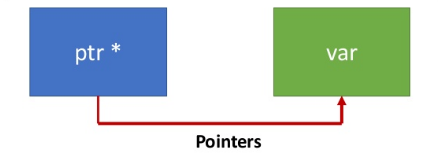Pointers in C++ can be defined as a variable whose value points to the address of another variable. Pointers can dynamically allocate the memory. While the pointer variable holds the address of the variable. And the pointers in C++ variable can also be known as locator (or) indicator.

Pointers in C++
The address of the memory is a numeric value. And it can be accessed by using variables identifier. If needed You can see this address by using the address-of operator (&) in front of the variable. While a declaration of the pointer is the same as the declaration of a simple variable except for use of * in the declaration.
Advantages of Pointers in C++
There are different types of pointers in C++. They are as follows:
- Saves the memory.
- Reduce the length and complexity of the program.
- It increases the processing speed.
- Allows passing of arrays and strings to functions more efficiently.
- It helps us to return more than one value from the functions.
- It makes you able to access any memory location in the computer’s memory.
Symbols Used in Pointers
| Symbol | Name | Description |
|---|---|---|
| & (ampersand sign) | Address operator | Determine the address of a variable |
| * (asterisk sign) | Indirection operator | Access the value of an address |
Using Pointers
- Define a pointer variable
- Assigning the address of a variable to a pointer using unary operator (&) which returns the address of that variable.
- Accessing the value stored in the address using unary operator (*) which returns the value of the variable located at the address specified by its operand.
Syntax: type *variable_name;
Declaring a Pointer in C++
int ∗a; //pointer to int char ∗c; //pointer to char
If you want to allocate memory for an array, you will have to useas follows:
Syntax: new data_type[size_of_array];
Example:
#include<bits/stdc++.h>
using namespace std;
void geeks()
{
int var=20;
//declare pointer variable
int *ptr;
//note that data type of ptr and var must be same
ptr = &var;
//assign the address of a variable to a pointer
cout<<"Value at ptr = " << ptr << "\n";
cout<<"Value at var = " << var << "\n";
cout<<"Value at *ptr = " << *ptr << "\n";
}
Output:
Value at ptr = 0x7fff480bf3fc
Value at var = 20
Value at *ptr = 20
Example 2:
#include <iostream>
using namespace std;
int main ()
{
int n = 20, *ptr; /* actual and pointer variable declaration */
ptr = &n; /* store address of n in pointer variable*/
cout << "Address of n variable: " << &n << endl;
cout << "Address stored in pntr variable:"<<ptr<<endl; /* print address stored in pointer variable */
cout << "Value of *pntr variable: " << *ptr << endl; /*print access the value using the pointer*/
system("pause");
return 0;
}
Output:
Address of n variable: 0x7ffd8764cd64
Address stored in pntr variable:0x7ffd8764cd64
Value of *pntr variable: 20
